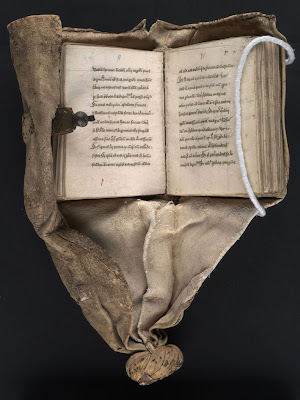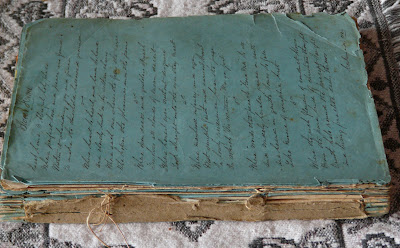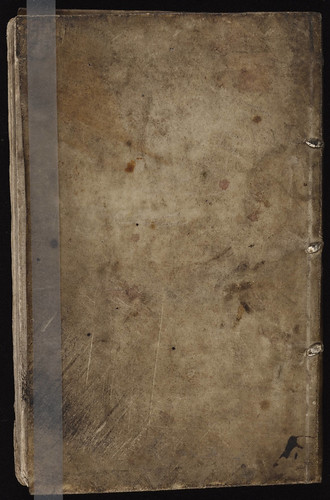Table of Contents
Scrapbooks and Commonplace books
“[L]et us take down one of those old notebooks which we have all, at one time or another, had a passion for beginning. Most of the pages are blank, it is true; but at the beginning we shall find a certain number very beautifully covered with a strikingly legible hand-writing. Here we have written down the names of great writers in their order of merit; here we have copied out fine passages from the classics; here are lists of books to be read; and here, most interesting of all, lists of books that have actually been read, as the reader testifies with some youthful vanity by a dash of red ink.” Virginia Woolf, “Hours in a Library,” Granite and Rainbow: Essays by Virginia Woolf (New York: Harcourt, Brace and Co., 1958), p. 25.“
“Commonplace books involve the noting, collecting and archiving of materials. Formerly Book of common places. orig. A book in which 'commonplaces' or passages important for reference were collected, usually under general heads; hence, a book in which one records passages or matters to be especially remembered or referred to, with or without arrangement. First usage recorded: 1578.”
http://beinecke.library.yale.edu/dl_crosscollex/SearchExecXC.asp?srchtype=CNO
When I find myself too earnest, too impatient, too much, I can be in conversation with other minds instead. Keeping a commonplace book feels like a kinder way to grow, by wrestling with the articulations of others in the open as I hopefully adjust myself within. —Charley Locke https://extragoodshit.phlap.net/wp-content/uploads/2022/03/Commonplace-Books-Are-Like-a-Diary-Without-the-Risk-of-Annoying-Yourself.html
Commonplacing is the act of selecting important phrases, lines, and/or passages from texts and writing them down. A commonplace book is then a notebook in which a reader has collected quotations from works he or she has read. These commonplace books often included comments and notes from the reader. They were a sort of reflective journal of what one read or learned during his life–a practice common to many of history’s leading thinkers.
https://www1.assumption.edu/users/lknoles/commonplacebook.html
- Commonplace books are a tool to help people think about the world. They were especially popular in the Renaissance and the 19th century, which were both periods of time with lots of new ideas to consider.
- Commonplace books are used to record anything that the writer considers important and wants to remember. The writers often jot down their response to the scraps of text they have collected.
- Every commonplace book is unique to the person that made it. You can’t predict what you will find in a commonplace book, because they reflect the interests of the creator. However, there are some general trends. Historic examples often contain recipes, quotes, letters, poems, proverbs, prayers, and legal formulas.
- They are more like a database than a diary. In the past many people used commonplace books as a way to order their ideas and make them easy to refer back to. Each entry was classified and ordered by subject and category- making them a useful way for scientists and scholars to take notes.
- Commonplace books are a window to the past. Reading a historic commonplace book can tell you a lot about the time it was written.
https://www.thereader.org.uk/10-fascinating-facts-about-commonplace-books/
Zuihitsu
“Zuihitsu (随筆) is a genre of Japanese literature consisting of loosely connected personal essays and fragmented ideas that typically respond to the author's surroundings. The name is derived from two Kanji meaning “at will” and “pen.” The provenance of the term zuihitsu is ultimately Chinese, however, being a transcription of suibi rendered into Japanese as fude ni shitagau (“follow the brush”). Thus works of the genre should be considered not as traditionally planned literary pieces but rather as casual or randomly recorded thoughts by the authors.”
Zibaldone
“During the course of the 15th century, the Italian peninsula was the site of a development of two new forms of book production: the deluxe registry book and the zibaldone (or hodgepodge book). What differentiated these two forms was their language of composition: a vernacular.[3] Giovanni Rucellai, the compiler of one of the most sophisticated examples of the genre, defined it as a “salad of many herbs.”
“Giacomo Leopardi is widely recognized as Italy’s finest modern lyric poet, for many the greatest after Dante. He was also one of the most radical and challenging of nineteenth-century thinkers, acknowledged as such by readers from Nietzsche to Benjamin and Beckett. In some senses, his poems may be regarded as explications and explorations of his philosophical ideas, but the primary laboratory in which Leopardi cultivated, nurtured, tested, and refined his analyses and thoughts was his immense notebook, the Zibaldone di pensieri. It was here that the thinker and poet, who was also a prodigious scholar of classical literature and philosophy, with an intimate knowledge of several ancient and contemporary languages, put down his original, wide-ranging, radically modern responses to his reading. His comments about religion, philosophy, language, history, anthropology, the natural sciences, literature, poetry, and love are unprecedented in their brilliance and suggestiveness.”
http://www.birmingham.ac.uk/research/activity/leopardi/projects/index.aspx
Zibaldone in English translation












